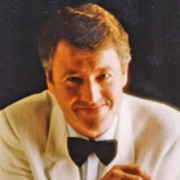
Terry Gray
Terry Gray used to say that writing music for television is 60 per cent mathematics, plus some orchestral skill and musical ideas. Gray's music and maths abilities ensured a rich career in New Zealand TV, including compositions for every genre from jazz and rock to orchestra.
Gray grew up in the English town of Reading, where by age 14 his life revolved almost entirely around piano, violin, and gigging in dance halls. After being fired from mapmaking training after sneaking home to write music, Gray began playing piano on ocean liners. He later became pianist for British jazz group The Malcolm Mitchell Trio, and ghost-wrote music for two low budget films - including arrangements for Nat King Cole.
In 1964 Gray and his Swiss wife relocated to New Zealand. Initially work opportunities were much thinner on the ground than in London, but Gray's concert and radio work caught the attention of a local TV producer. He was invited to play on keyboards for puppet show Quack and Bimbo, and vibes on Play it By Ear. But his break came with TV's Festival Revue '66.
Initially Gray was hired to play piano while producer Bryan Easte auditioned hopeful performers. But when the variety show went to air (live in Auckland, and as a three part show elsewhere) 26-year-old Gray was the compere, fronting a 32 piece orchestra he'd arranged 25 tunes for.
So began a long television career as a freelance composer, arranger, musical director and occasional keyboardist for hire - from commercials and dramas, to variety shows and nature documentaries (acclaimed The Black Stilt, and Feltex-nominated Kakapo: Night Parrot).
Initially Gray made most of his money from radio and TV commercials, including composing the iconic 'Ches and Dale' animated spots for Chesdale Cheese. People often told him what terrible tunes he was writing, before proceeding to sing his commercial "word for word and right in tune".
Gray's abilities with short tunes would later see him providing TV theme tunes for news, station identifications, Miss New Zealand pageants and the 1982 Commonwealth Games. Much of his television work involved arranging music for variety and live event shows, where he worked beside talents Billy T. James, Rob Guest, Frankie Stevens, and Rolf Harris.
TV scoring was fast turnaround, with Gray sometimes putting pen to paper only 10 days before recordings began. Louise and Friends (featuring opera singer Louise Malloy) required writing a trio of arrangements for orchestra at less than a day's notice.
With an eye on international sales, TVNZ entertainment head Tom Parkinson arranged a television special featuring dance legend Gene Kelly, the NZ Ballet Company, and choreographer (and later American Idol creator) Nigel Lythgoe. The result was 1983's Gotta Dance. Gray arranged the music. Later he travelled New Zealand auditioning talent with Jason Gunn for Young Entertainers.
Though Gray's work composing for TV drama dates back as early as 1967's Ngaio Marsh teleplay Slipknot, the majority dates from the 80s. Finally leaving freelance days behind, he commenced an eight year stint as musical director for TVNZ at Avalon. Gray composed for the acclaimed Kingi's Story, The Fire-Raiser, and three plays by Bruce Mason (including The Garlick Thrust). He also won a GOFTA for scoring legal drama Hanlon, and was part of the jazz trio appearing on Ian Johnstone's Speakeasy.
Kidult adventure series Sea Urchins saw Gray leading an 85-strong New Zealand Symphony Orchestra. On the second Sea Urchins series (another Feltex-nominated score) Gray created underwater sounds via electronics, and bashing piano strings with a mallet.
Ambitious period 60s show Peppermint Twist saw characters bursting into song, and required arrangements for 120 classic tunes. An accompanying album was also released. Around this time promoter Stewart MacPherson suggested recording a CD, to help fulfill Gray's dream of touring an orchestra around New Zealand. The tour didn't happen, but the CD, Solitaire, reached number three in the local charts. Included were Gray's compositions for comedy series An Age Apart and Bruce Mason's Daphne and Chloe.
There were spells outside of the business - including an aborted attempt to start a handcrafted furniture business in the late 70s. Later, his 90s radio show The Terry Gray Hour mixed music with show business reveries. He retired in 2000, to live near Dunedin. An often-humorous, upbeat presence despite increasing periods of bad health, Terry Gray died of leukemia on 8 July 2011.
Sources include
Terry Gray
Cherie Bousie
Robert Boyd-Bell, New Zealand Television - The First 25 Years (Auckland: Reed Methuen Publishers, 1985)